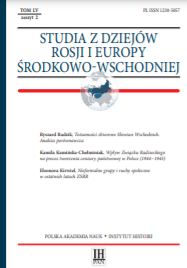Rzeczywistość sądowo-prawna jednodworców w świetle dzieła Wincentego Dunin-Marcinkiewicza Pińska szlachta
The Judicial and Legal Reality of Odnodvortsy in the Light of Wincenty Dunin-Marcinkiewicz’s Work The Nobility of Pinsk
Author(s): Karol ŁopateckiSubject(s): Law, Constitution, Jurisprudence, Belarussian Literature, Sociology of Law
Published by: Instytut Historii im. Tadeusza Manteuffla Polskiej Akademii Nauk
Keywords: odnodvortsy; Wincenty Dunin-Marcinkiewicz; Russian judiciary of the 19th c.; legal culture; corruption; nobility in the 19th c.; tradition of the Grand Duchy of Lithuania;
Summary/Abstract: The article presents an analysis of historical and legal reality depicted in Wincenty Dunin-Marcinkiewicz’s work The Nobility of Pinsk. It is the work of utmost importance for the Belarusian national culture, and an outstanding primary source depicting the legal culture of the epoch. The Nobility of Pinsk was written in 1866, and it reflects the situation of the degraded nobility who after 1831 was ranked as the odnodvortsy - ‘owners of one homestead’. They had their own laws and duties that placed them between the dvorians and the peasantry. Despite the text’s form of comedy, the political culture of this class was painted in extremely dark colours. According to Wincenty Dunin-Marcinkiewicz, the judicial and police omnipotence of the land court and local court pristavs was total. On the other hand, the knowledge of law and their liberties among the odnodvortsy was at a very low level. Th e only way for them to settle the case was either through fraud (to bribe witnesses) or through omnipresent corruption. What draws attention is constant reminding of the Third Lithuanian Statute, which - despite being legally invalid for 26 years (1840) - was notoriously quoted in court, for it was regarded as the symbol of the judiciary by the contemporaries. Under the pretence of the cited normative acts which in fact did not exist or did not apply, the problem of non-application of the rules of law in judicial and police organs and far-reaching corruption is emphasised.
Journal: Studia z Dziejów Rosji i Europy Środkowo-Wschodniej
- Issue Year: 55/2020
- Issue No: 2
- Page Range: 5-31
- Page Count: 27
- Language: Polish

